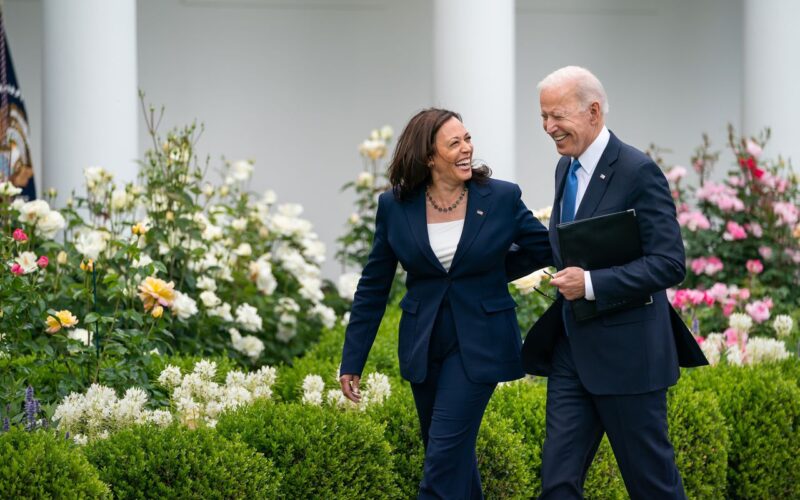As of Sunday morning, Joe Biden, the oldest candidate to run for president in US history, was still planning to rejoin the campaign trail.
Campaign staff were calling delegates urging them to declare their support for the president on social media. But by 1.45 pm local time, he had changed his mind and reportedly told his senior staff from his Rehoboth beach house in Delaware that he was dropping out.
According to the New York Times, Mr Biden called two of his most senior aides, Steve Ricchetti and Mike Donilon, to his home in Rehoboth Beach on Saturday afternoon, where he has been self-isolating after contracting Covid-19.
The three men worked on Mr Biden’s letter dropping out of the race “far into the night,” the Times reported. Most of Mr Biden’s staff were told about his decision only one minute before he posted the letter, although his family and closest circle were told on Saturday.
By that stage, nearly three dozen Congressional Democrats had publicly called on him to quit. But it was arguably an intervention that took place four days earlier – one that his campaign had arguably feared more than any other – that struck the final blow.
On Thursday, Barack Obama let it be known that he felt Joe Biden should seriously consider standing down in order to protect the party and his legacy.
The polls were moving away from him, the 44th president reportedly told allies. The path to victory was greatly diminished.
Mr Biden’s re-election campaign, and in essence his five-decade political career, is now over.
For three long weeks since the president’s catastrophic debate with Donald Trump in Atlanta, Mr Obama had kept his counsel.
Indeed, in the stunned aftermath it was his immediate statement of support that had helped steady the ship. “Bad debates happen,” he tweeted. “Trust me, I know.” Bill Clinton, another two-term Democratic president, also put out a supportive message.
Nevertheless, the party establishment was appalled. As Mr Biden retreated to Camp David for the weekend, his family flocked to his side.
Reports circulated that Democrats were laying the groundwork for a “dignified exit”, while more than one commentator speculated – perhaps wishfully – that the president’s loved ones would gently seek to persuade the 81-year-old to stand down.
Any such hopes were quashed when sources in Mr Biden’s entourage briefed the media that Jill Biden, Hunter Biden et al had urged the president to stay in the race. Mrs Biden vowed to “continue the fight”.
The same day, the New York Times formally called on the president to drop his “reckless gamble” and quit the race – a significant intervention, given the title’s prestige among Democrats.
However, as July began, the party itself, publicly at least, was holding firm. Then along came Nancy Pelosi.
On July 3 the former speaker, a hugely influential figure in the Democratic Party, lit rocket fuel under the question of the president’s fitness for office when she said: “I think it’s a legitimate question to say ‘is this an episode or is this a condition?’”
While not herself calling for Mr Biden to drop out, she had arguably given a green light for others to do so. A congressman from Texas, Lloyd Doggett, duly obliged, becoming the first Democrat on Capitol Hill to call for his president to quit.
Within hours, Carl Bernstein, the legendary Watergate journalist, reported that Mr Biden had appeared incapacitated in a way similar to during the disastrous debate on 15 to 20 occasions in the previous 18 months.
Over the following 48 hours, Mr Biden’s position was steadily undermined, first by a story in the New York Times saying he was considering standing down; second by CNN, which reported that officials were working on a plan to transfer support to Kamala Harris, the vice-president.
Were senior elements within the Democratic camp briefing against the president to destabilise him, or was it simply a case of talented reporters finding stuff out?
The following day, however, July 6, Mr Biden managed that all on his own. In a gaffe that was virtuosic even by his standards, he told an interviewer he was proud to be the first “black woman” in the White House.
Although former advisers to Mr Obama and Mr Clinton were calling on Mr Biden to quit on various TV shows and podcasts, no elected Democrat with major heft had yet followed suit. But neither were they clamouring in support.
The silence from the two former presidents was also growing deafening. Talk began to emerge of influential party figures circulating negative polling data on Capitol Hill and among donors.
However, authoritative journalists were reporting that this activity was, in the main, uncoordinated: there was no grand plot.
But, once again, they didn’t reckon on Ms Pelosi. On July 10, she went on MSNBC’s Morning Joe to say: “It’s up to the president to decide if he is going to run. We’re all encouraging him to make that decision because time is running short.”
For the best part of a fortnight, the opposition within the party had operated mostly out of sight. But now a close ally of the president was publicly discussing his continued candidacy as an open question.
Given her age, 84, and the fact that as a former speaker towards the end of her career she can’t be accused of currying favour with any particular faction, Ms Pelosi’s comments carried significant weight.
Mr Biden’s camp will have been acutely aware of Ms Pelosi’s loyal following in Congress, particularly among the so-called “California Mafia”.
Within days, reports emerged suggesting that the likes of Adam Schiff, Mike Levin and Jared Huffman were co-ordinating their efforts, organising letters and sharing polling data.
On July 11, CNN reported that Pelosi had spoken privately to Mr Obama and that both had expressed their concerns.
He had, we were told, fielded many similar calls.
Tellingly, a confidant of Mr Biden’s former boss was that week reported as saying: “He [Obama] is going to be all in for the Democratic ticket. No matter who our nominee is.”
Was the 44th president quietly working behind the scenes to unseat his erstwhile deputy?
His allies stress not. But whether he was or not, his silence appeared to provoke serious mistrust among parts of the Biden campaign.
When George Clooney – a long-time friend and supporter of Mr Obama and Mr Biden – penned a column in the New York Times calling on the president to quit, furious loyalists accused Mr Obama’s camp of being behind it.
By the end of the week, one Democratic senator, Peter Welch of Vermont, and 17 Democratic members of the House had publicly called on the president to quit the race.
It had probably not helped that while hosting the Nato summit in Washington, which was primarily focused on aiding Ukraine, Mr Biden had introduced Volodymyr Zelensky as “president Putin”.
The attempted assassination of Trump in Butler, Pennsylvania, on Saturday July 13 sucked all oxygen out of the story around Mr Biden.
For several days, the idea of unseating the president seemed to violate the mood of conciliation that had temporarily descended on the wider political class.
But on Wednesday, the hiatus ended. Mr Schiff publicly called on Mr Biden to “pass on the torch”, declaring the nation to be “at a crossroads”.
If that had been all, it might not have been so bad. But there were to be two further bombshells. Late in the evening, ABC reported that Chuck Schumer, Senate majority leader, one of the most important Democrats in the country, had been to visit Mr Biden at his Delaware beach house on the previous Saturday in order to tell him that he should quit.
Politico later reported that he had been accompanied by Hakeem Jeffries, House minority leader. Neither explicitly denied it.
On Wednesday, it also became known that Ms Pelosi had had a direct conversation with Mr Biden “within the last week”, during which she had reportedly discussed the negative polls with him, telling him that he could not beat Trump and that his continuity candidacy would harm the chances of Democratic candidates for the House and Senate in November.
Her office indicated the call had taken place before the weekend. Had she called in advance in order to soften Mr Biden up before the big beasts arrived from Congress?
On Wednesday, Mr Biden cancelled a campaign event in the city and flew home to Delaware, his campaign announcing that he had contracted Covid.
Arriving in Delaware, a Secret Service agent was filmed apparently helping Mr Biden to lift his legs into the car. CNN reported a shift in the president’s mood, saying that he “seems to be listening”.
“The private conversations with the Hill are continuing,” a senior Democratic adviser told the network. “He’s being receptive. Not as defiant as he is publicly. He’s gone from saying, ‘Kamala can’t win’ to ‘Do you think Kamala can win?’”
At around that time it emerged Mr Biden had said in an interview with Bet news that he would consider stepping down if a doctor told him he had a condition that made it necessary.
Then, on Thursday, Mr Obama appeared to take the decision out of his hands. The man who had swept to victory in 2008 with the message “yes we can”, was now telling his former number two, and the world, “no you can’t”.
Mr Biden could perhaps have ignored the combined assault of Ms Pelosi, Mr Schumer and Mr Jeffries, but not Mr Obama as well. The Democratic Party had finally got its message across. (Telegraph)




